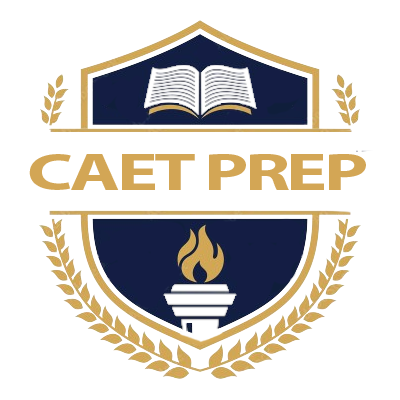How to Prepare for CAET 2024: A Comprehensive Guide
## Understanding the CAET Exam
Before diving into preparation tips, let's review the CAET syllabus. The CAET exam includes questions from:
### Physics
- **Mechanics**: Translational and Rotational Motion, Newton’s Laws, Work, Energy, Power, Momentum, Fluids.
- **Electromagnetism**: Electricity and Magnetism, including circuits and electromagnetic induction.
- **Waves and Optics**: Wave properties, sound, light, and optical instruments.
- **Modern Physics**: Relativity, Quantum Mechanics, Atomic and Nuclear Physics.
- **Thermal Physics**: Heat, Thermodynamics, and the Kinetic Theory of Gases.
### Chemistry
- **Chemical Foundation**: Scientific processes, measurement units, and calculations.
- **Inorganic Chemistry**: Atomic theory, periodicity, chemical bonding, acids and bases, and redox reactions.
- **Organic Chemistry**: Properties, reactions, and nomenclature of hydrocarbons, alcohols, aldehydes, ketones, carboxylic acids, and polymers.
- **Physical Chemistry**: Gas laws, reaction rates, equilibrium, thermodynamics, and calorimetry.
- **Analytical Chemistry**: Experimental methods, qualitative analysis, and safety principles.
- **Nuclear Chemistry**: Radioactivity, nuclear reactions, and their applications.
### Mathematics
- **Algebra**: Polynomial operations, equations, functions, and trigonometry.
- **Geometry**: Transformations, congruence, similarity, theorems, circles, and conic sections.
- **Statistics**: Data interpretation, probability, and statistical models.
## Step-by-Step Preparation Guide
### 1. Create a Study Plan
A structured study plan is essential. Allocate specific time slots for each subject and stick to the schedule. Here’s a sample plan:
- **Weekdays**: Focus on two subjects per day, rotating them throughout the week.
- **Weekends**: Use weekends for revision and taking full-length mock tests.
### 2. Gather Study Materials
Ensure you have the necessary study materials, including:
- NCERT textbooks for Physics, Chemistry, and Mathematics.
- Reference books tailored to CAET.
- Previous years’ question papers and sample papers.
### 3. Focus on Understanding Concepts
A strong grasp of fundamental concepts is crucial. Make sure your basic concepts in each subject are clear. If you struggle with any topic, seek help from teachers, online resources, or study groups.
### 4. Practice Regularly
Practice is key to success in CAET. Regularly solve previous years' question papers and take mock tests. This helps you:
- Understand the exam pattern.
- Improve time management skills.
- Identify strengths and weaknesses.
### 5. Time Management
Effective time management is critical during preparation and on the exam day. Practice solving questions within a time limit to enhance speed and accuracy.
### 6. Take Care of Your Health
A healthy mind resides in a healthy body. Ensure you:
- Get adequate sleep.
- Eat nutritious food.
- Take regular breaks during study sessions.
- Engage in physical activities to reduce stress.
### 7. Stay Updated
Keep yourself updated with any announcements or changes in the exam pattern or syllabus. Regularly visit the official CAET website and stay in touch with your teachers and peers for updates.
### 8. Join Coaching Classes (if necessary)
If you find it challenging to prepare on your own, consider joining coaching classes. They provide structured learning, expert guidance, and additional study materials.
### 9. Stay Positive and Confident
Confidence plays a crucial role in your performance. Practice meditation and mindfulness techniques to stay calm and focused. Believe in yourself and your preparation.
## Subject-wise Preparation Tips
### Physics
- **Mechanics**: Practice problems related to Newton's laws, work-energy theorem, and rotational motion.
- **Electromagnetism**: Focus on circuits, electromagnetism principles, and problem-solving techniques.
- **Waves and Optics**: Understand wave properties and light behavior, practice problems on interference and diffraction.
- **Modern Physics**: Grasp concepts of relativity and quantum mechanics through problem-solving and theoretical study.
- **Thermal Physics**: Focus on laws of thermodynamics and heat transfer mechanisms.
### Chemistry
- **Chemical Foundation**: Review scientific processes, unit conversions, and density calculations.
- **Inorganic Chemistry**: Master periodic table trends, bonding theories, and acid-base reactions.
- **Organic Chemistry**: Learn nomenclature, reaction mechanisms, and functional group properties.
- **Physical Chemistry**: Practice gas laws, equilibrium problems, and thermodynamics calculations.
- **Analytical Chemistry**: Focus on experimental methods and safety principles.
- **Nuclear Chemistry**: Understand radioactive decay processes and nuclear reactions.
### Mathematics
- **Algebra**: Practice polynomial operations, solving equations, and understanding functions.
- **Geometry**: Solve problems involving transformations, congruence, and geometric theorems.
- **Statistics**: Interpret data, calculate probabilities, and understand statistical models.
## Conclusion
Preparing for CAET 2024 requires dedication, consistent effort, and a strategic approach. Start early, follow a structured study plan, and stay focused on your goals. With the right preparation, you can achieve success in the CAET exam and secure admission to IIT Delhi’s prestigious Abu Dhabi campus. Good luck!



